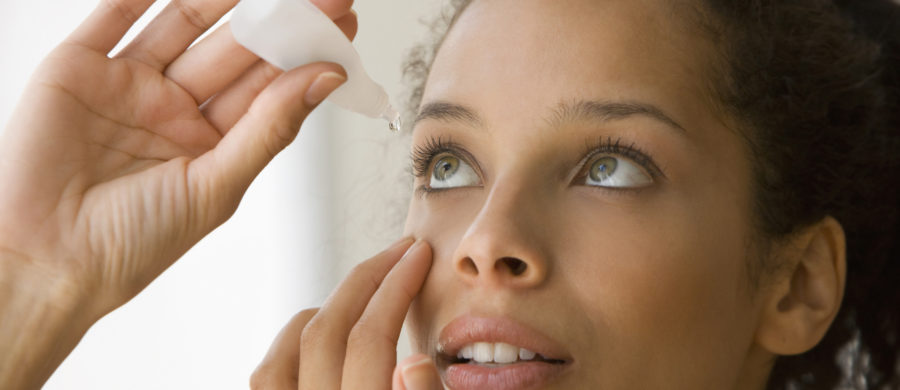The eye drop section of your local pharmacy or supermarket can be overwhelming. Some stores have over one hundred different drops that treat a variety of conditions. Before talking about specific eye drops, let’s take a look at a few of the most of the common causes of eye irritation that I see with my patients at Boulder Medical Center:
- Dry Eyes – the most common cause of eye irritation, burning, and redness that I see in Colorado
- Blepharitis – eyelid inflammation caused by blockage of tear glands. Also referred to as meibomian gland dysfunction or ocular rosacea
- Allergic Conjunctivitis – eye inflammation caused by allergies
- Viral Conjunctivitis – inflammation of the transparent membrane that lines your eyelid and covers the white part of your eyeball, caused by a viral infection
Over-The-Counter Remedies
The most common eye drops that I recommend, especially for Colorado’s dry air, are lubricating drops. These work by introducing tear elements that add moisture to your eye, similar to how moisturizing lotion keeps your hands and skin from drying out and becoming irritated. Choosing the best lubricating drop is often a personal choice, and I find that many of my patients do well with brands such as Systane, Refresh, or Soothe XP. I have not found an eye drop that most of my patients prefer, as there are many options with various active ingredients, viscosities, and other characteristics. Keep in mind that preservatives in eye drops can occasionally cause an allergic reaction, so preservative-free drops are often available for patients that are sensitive to preservatives.
Symptoms of blepharitis include red eyes and/or eyelids, styes, itching, or burning. Warm compresses and eyelid scrubs using baby shampoo or Ocusoft are the mainstays of treatment. Systane Balance and Retaine MGD are specifically formulated for this condition as well.
For eye irritation caused by allergies, Ketotifen (Alaway, Zaditor) can be effective. These medications are mast cell stabilizers that prevent or control certain allergic disorders. They are safe to use for itchy eyes twice a day during allergy season.
If you have severe dry eye problems that are not relieved by eye drops, you may need a lubricating gel or ointment. Because gels and ointments for dry eyes can cause blurry vision after application, most people use these products just before going to sleep.
Prescription Medications
If over-the-counter drops or ointments do not alleviate your symptoms, a prescription may be necessary. Restasis and Xiidra are two prescriptions that may be effective for dry eye symptoms. The active ingredient in Restasis is cyclosporine, which belongs to a class of drugs known as immunosuppressants. Restasis decreases inflammation in the eye and lacrimal gland (this gland secretes an aqueous tear film) to increase tear production. Restasis can take up to three months for patients to notice an improvement. Xiidra (lifitegrast ophthalmic solution) is a newer prescription drop that blocks the protein that can exist on the cells’ surface on the front of your eye. This protein can block the production of healthy tears, increasing dry eye symptoms.
An issue with both of these prescriptions is that they can be expensive and may not be supported by your insurance. Talk to your eye doctor to see if additional procedures may be effective.
Drops to Avoid
It’s best to avoid decongestant eye drops such as Visine, Naphcon, Opcon, or Clear Eyes when treating dry eyes. You can recognize these drops because they are typically advertised as a relief for red eyes or allergies. These drops make your eyes look less red by constricting the blood vessels in the eye but can worsen your symptoms. Moreover, your eye can also become addicted to these medications when used frequently.
Certain products temporarily improve your eye irritation symptoms, but it’s important to remember that conditions such as dry eyes can be related to other health problems or medications. It would be best if you had your eye health evaluated annually. Knowing the cause of the dryness will help you and your doctor make the best choice of eye drops and other treatments.
My next article discusses the ingredients of different over-the-counter eye drops to help you better understand your choices. — Dr. Ken Kreidl
 About Dr. Ken Kreidl
About Dr. Ken Kreidl
Ophthalmologist at Boulder Medical Center
Dr. Kreidl, originally from San Francisco, California, started practicing at the Boulder Medical Center in August 2004. He and his wife, Ryn, a local pediatrician, have two children, Luke and Max. Dr. Kreidl loves mountain biking and skiing with his family, and was a nationally ranked tennis player before becoming dedicated to medicine.
Dr. Kreidl offers a full range of ophthalmology services and treatments for conditions including:
- Surgery – Crystalens and Trulign accommodative lenses
- Glaucoma – SLT, ALT, LPI
- Diabetes – Retinal laser surgery
- Dry Eyes
- Eyelid surgery
- Eye Trauma
- Complete eye exams
- Contact Lenses
- Glasses


